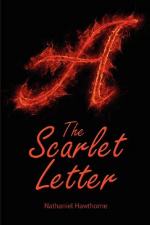One of these seafaring men the shipmaster, indeed, who had spoken to Hester Prynne was so smitten with Pearl’s aspect, that he attempted to lay hands upon her, with purpose to snatch a kiss. Finding it as impossible to touch her as to catch a humming-bird in the air, he took from his hat the gold chain that was twisted about it, and threw it to the child. Pearl immediately twined it around her neck and waist with such happy skill, that, once seen there, it became a part of her, and it was difficult to imagine her without it.
“Thy mother is yonder woman with the scarlet letter,” said the seaman, “Wilt thou carry her a message from me?”
“If the message pleases me, I will,” answered Pearl.
“Then tell her,” rejoined he, “that I spake again with the black-a-visaged, hump shouldered old doctor, and he engages to bring his friend, the gentleman she wots of, aboard with him. So let thy mother take no thought, save for herself and thee. Wilt thou tell her this, thou witch-baby?”
“Mistress Hibbins says my father is the Prince of the Air!” cried Pearl, with a naughty smile. “If thou callest me that ill-name, I shall tell him of thee, and he will chase thy ship with a tempest!”
Pursuing a zigzag course across the marketplace, the child returned to her mother, and communicated what the mariner had said. Hester’s strong, calm steadfastly-enduring spirit almost sank, at last, on beholding this dark and grim countenance of an inevitable doom, which at the moment when a passage seemed to open for the minister and herself out of their labyrinth of misery—showed itself with an unrelenting smile, right in the midst of their path.
With her mind harassed by the terrible perplexity in which the shipmaster’s intelligence involved her, she was also subjected to another trial. There were many people present from the country round about, who had often heard of the scarlet letter, and to whom it had been made terrific by a hundred false or exaggerated rumours, but who had never beheld it with their own bodily eyes. These, after exhausting other modes of amusement, now thronged about Hester Prynne with rude and boorish intrusiveness. Unscrupulous as it was, however, it could not bring them nearer than a circuit of several yards. At that distance they accordingly stood, fixed there by the centrifugal force of the repugnance which the mystic symbol inspired. The whole gang of sailors, likewise, observing the press of spectators, and learning the purport of the scarlet letter, came and thrust their sunburnt and desperado-looking faces into the ring. Even the Indians were affected by a sort of cold shadow of the white man’s curiosity and, gliding through the crowd, fastened their snake-like black eyes on Hester’s bosom, conceiving, perhaps, that the wearer of this brilliantly embroidered badge must needs be a personage of high dignity among her people. Lastly, the inhabitants of the town (their




